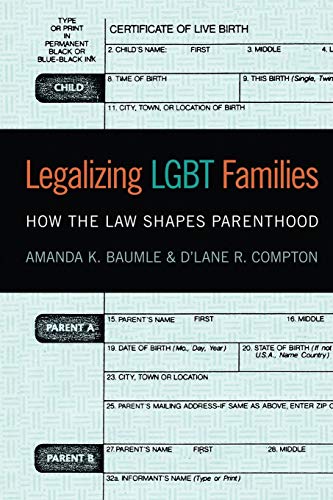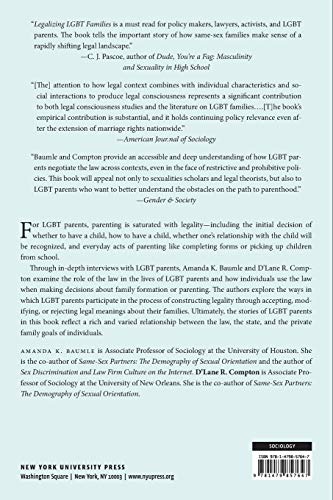The decision to have a child is seldom a simple one, often fraught with complexities regarding emotional readiness, finances, marital status, and compatibility with life and career goals. Rarely, though, do individuals consider the role of the law in facilitating or inhibiting their ability to have a child or to parent. For LGBT individuals, however, parenting is saturated with legality – including the initial decision of whether to have a child, how to have a child, whether one’s relationship with their child will be recognized, and everyday acts of parenting like completing forms or picking up children from school. Through in-depth interviews with 137 LGBT parents, Amanda K. Baumle and D’Lane R. Compton examine the role of the law in the lives of LGBT parents and how individuals use the law when making decisions about family formation or parenting. Baumle and Compton explore the ways in which LGBT parents participate in the process of constructing legality through accepting, modifying, or rejecting legal meanings about their families. Few groups encounter as much variation in access to everyday legal rights pertaining to the family as do LGBT parents. This complexity and variation in legal environments provides a rather unique opportunity to examine the manner in which legal context affects the ways in which individuals come to understand the meaning and utility of the law for their lives. The authors conclude that legality is constructed through a complex interplay of legal context, social networks, individual characteristics, and familial desires. Ultimately, the stories of LGBT parents in this book reflect a rich and varied relationship between the law, the state, and the private family goals of individuals.
Legalizing LGBT Families: How the Law Shapes Parenthood
BooksPolitics and Social SciencesSocial SciencesAmazon.com Price: $30 (as of 28/11/2023 13:15 PST- Details)
Additional information
| Author | |
|---|---|
| Author 2 |







Reviews
There are no reviews yet.